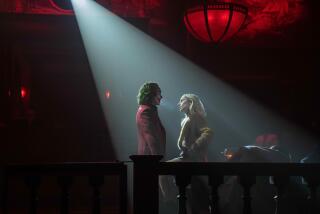A top scorer in the movie game
- Share via
DURING a career that endured nearly five decades, Hungarian-born Miklós Rózsa composed scores for fantasy and adventure films, historical epics, film noir, romances and psychological thrillers. He won Academy Awards for 1945’s “Spellbound,” 1947’s “A Double Life” and 1959’s “Ben-Hur” -- he was nominated 17 times between 1940 and 1961 -- and took three months off every year to write classical pieces.
“That is why he called his autobiography ‘A Double Life,’ not only as a reference to his second Oscar winner but also because that is how he felt,” says film music historian Jon Burlingame.
“Rózsa was one of those guys who was a substantial composer,” echoes film composer Bruce Broughton (“Silverado”). “When he went into film music, apparently he used as much invention as he would in any kind of music. He had such a substantial craft and technique that it came out in very high quality.”
On Aug. 17, the Academy of Motion Picture Arts and Sciences will kick off its “Academy Centennial Salute to Miklós Rózsa” at the Samuel Goldwyn Theater. The 1952 historical adventure “Ivanhoe” will be screened before a panel discussion with film historian Rudy Behlmer, Broughton and the composer’s daughter, Juliet Rózsa. Burlingame will host the evening.
The following evening, 1940’s “The Thief of Bagdad” and 1946’s “The Killers” will screen at the Linwood Dunn Theater. The celebration concludes Aug. 19 at the Dunn with 1961’s epic “El Cid,” for which Rózsa received nominations for his score and the song “Love Theme From El Cid -- The Falcon and the Dove.”
Rózsa, born in Budapest in 1907, became a violinist at age 5. After studying in Leipzig, he worked in Paris and London and wrote chamber and symphonic works and even a ballet.
He got his first taste for film composing in London when he worked for Hungarian producer Alexander Korda on the 1937 film “Knight Without Armor.” For Korda, he also penned the scores for “Thief of Bagdad,” which landed him his first nomination, and “Four Feathers.”
He collaborated with Billy Wilder several times, most notably on “Double Indemnity,” “The Lost Weekend” and “The Private Life of Sherlock Holmes.” At MGM in the 1950s, he excelled at historical and biblical epics. And he continued to score films into the early 1980s, ending his career with Steve Martin’s comedy “Dead Men Don’t Wear Plaid.” Rózsa died in 1995.
Among the European-born composers who dominated Hollywood films in the 1930s and ‘40s, including Erich Wolfgang Korngold, Bernard Herrmann, Dimitri Tiomkin and Franz Waxman, probably none was more innovative than Rózsa.
He incorporated the theremin, one of the earliest electronic music instruments, into his Oscar-winning score for Alfred Hitchcock’s psychological thriller “Spellbound” as well as for Wilder’s hard-hitting look at alcoholism, “The Lost Weekend.”
Behlmer says the composer had tried to introduce electronic music into earlier films, without luck. “But both Hitchcock and producer David O. Selznick said they would like a new sound for ‘Spellbound,’ ” says Behlmer. Rózsa told them about the theremin, and Hitchcock and Selznick told him to do a test score on one sequence. They liked the effect and gave it the green light.
Rózsa also used the theremin for “Lost Weekend.” But his decision angered Hitchcock and Selznick when “Lost Weekend” was released before “Spellbound.” The new sound Hitchcock and Selznick wanted wasn’t going to be so new.
“Needless to say, he didn’t work for Mr. Selznick or Mr. Hitchcock again,” says Behlmer.
Burlingame revels in the passion in Rózsa’s scores. “Think about the love themes from ‘Ben-Hur’ and ‘El Cid,’ ” he says. “There is such a great, overwhelming passion to that music. I find that his use of melody is part and parcel of the emotion that he brought to his scores.”
A similar passion, says Burlingame, is also in his classical compositions. “What’s interesting about his concert music is that there is a good deal more of his own roots in it,” he says. “He was a big fan of the folk songs of his native Hungary. There’s so much folk feeling in his concert music. I think you occasionally hear a Hungarian touch in his films scores, but you hear it in his concert music.”
Rózsa’s MGM contract allowed him to work at home and take three months of unpaid leave a year so he could compose in Europe and teach at USC. Juliet Rózsa recalls that her father led a very structured life.
“He would get up and have breakfast at the same time every morning. He would go downstairs [and compose]. He would come up for lunch and take a siesta in the afternoon and play until dinner. Then after dinner, depending on how tired he was, sometimes he would compose. Mostly he would just read.”
Her dad, she says, had a great sense of humor, though he wasn’t a “typical” father. “We wouldn’t go off to baseball games,” says Rózsa. “He was very European. Sundays we would always go off and do something together, which was usually cultural. He instilled in me and my brother . . . this incredible sense of beauty.”
--
Salute to Rózsa
Where: The Samuel Goldwyn Theater, Academy of Motion Picture Arts and Sciences, 8949 Wilshire Blvd., Beverly Hills; the Linwood Dunn Theater, 1313 Vine St., Hollywood
When: 7:30 p.m. Aug. 17 at the Goldwyn; 7 and 9 p.m. Aug. 18 and 7 p.m. Aug. 19 at the Dunn.
Price: $3 and $5
Contact: (310) 247-3600 or go to www.oscars.org
Schedule
Aug. 17: “Ivanhoe”
Aug. 18: “The Thief of Bagdad,”
7 p.m.; “The Killers,” 9 p.m.
Aug. 19: “El Cid”
More to Read
Only good movies
Get the Indie Focus newsletter, Mark Olsen's weekly guide to the world of cinema.
You may occasionally receive promotional content from the Los Angeles Times.











